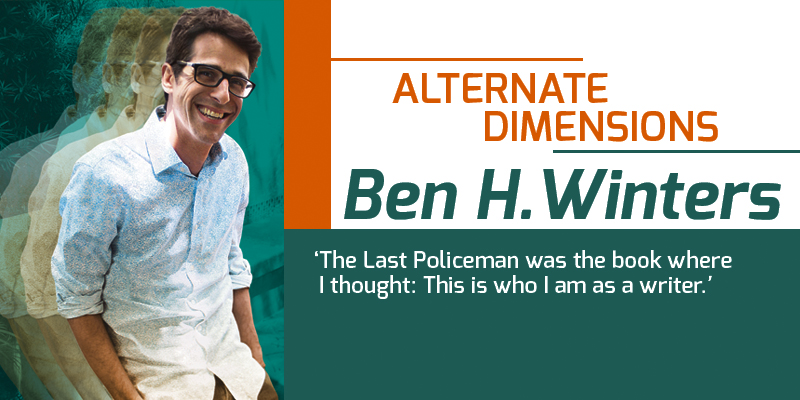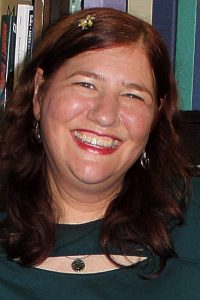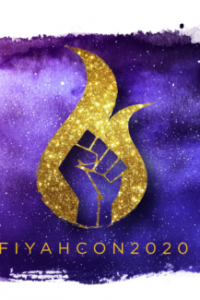Ben H. Winters: Alternate Dimensions

Benjamin Allen H. Winters (he added the “H” after he got married; it’s the first letter of his wife’s maiden name) was born June 14, 1976 in Washington DC and grew up in Maryland. He attended Washington University in St. Louis MO. Winters played in a punk band and wrote and performed in theater before switching his focus to writing. He’s lived all over the country, and currently resides in Los Angeles with his wife and children.
His first novel was the bestselling Jane-Austen-with-monsters mash-up Sense and Sensibility and Sea Monsters (2009), a conceptual sequel to Seth Grahame-Smith’s Pride and Prejudice and Zombies (2009), from Quirk Books. He also wrote the mash-up Android Karenina (2010). Children’s mystery The Secret Life of Ms. Finkleman appeared in 2010, followed by sequel The Mystery of the Missing Everything (2011). He also wrote the horror novel Bedbugs (2011).
Winters’s first wholly original work of adult SF was Edgar Award winner The Last Policeman (2012), a mystery set on an Earth about to be destroyed by a massive asteroid. Sequel Countdown City (2013) won the Philip K. Dick Award, and World of Trouble (2014) concluded the series. Alternate history Underground Airlines (2016), set in a US where slavery was never abolished, won the Sidewise Award. His latest novel, Golden State (2019), is a dystopian mystery in a world where all falsehoods (including fiction) are outlawed.
Winters has also written some short fiction, various works of non-fiction (including contributions to the Worst-Case Scenario series), and several plays. He also wrote a series of scary poetry books for young readers: Literally Disturbed: Tales to Keep You Up at Night (2013), Literally Disturbed 2: More Tales to Keep You Up at Night (2015), and Romantically Disturbed: Love Poems to Rip Your Heart Out (2015).
Excerpts from the interview:
“I always felt like a writer, in the way a lot of future writers do. I always wanted to write, and I always did, in different forms. When I was younger I saw myself more as a performer. In college I did comedy improvisation, and after college I moved to Chicago and tried to do standup. I also did some improv, and wrote for a little alternative weekly paper. I eventually ended up in New York and did theater there for a long time. I wrote plays and musicals and tried to make a career in theater, which is not easy. Unless you’re supremely talented or you get some really good breaks, it’s hard to make a living in theater. After I got married and started a family, it became increasingly clear that I wasn’t going to be a professional in the theater. I had a couple of lucky breaks and started writing books, and stuck with that.
“I was working a day job all that time. I worked at a theater website and had a transcription business. I worked for authors and ghostwriters especially, and some filmmakers, and did a lot of typing up of digital files. For years I made my living doing that, which was great because it was flexible, and I learned a lot about patterns of speech and thought. When you type up interviews (like this), you see the ways that people construct sentences – even the ways that power dynamics work in conversation. It’s really fascinating. I didn’t find it that fascinating at the time, but by osmosis I learned a lot about how to write from that work.
“I started my fiction writing career on two tracks at once. I had been trying to develop a musical that didn’t work out, so I wrote the first few chapters as a novel. I got with an agent, and she said, ‘This could be a great middle-grade novel,’ so we sold The Secret Life of Ms. Finkleman to HarperCollins Children’s. Simultaneously I started doing some stuff for Quirk Books in Philadelphia, non-fiction goofy stuff, and then they needed someone to write the sequel to Pride and Prejudice and Zombies. That book came out in 2009, written by Seth Grahame-Smith from an idea they came up with in-house at Quirk. It was this huge, shocking, surprise hit for them, but Seth didn’t want to do another one. They needed someone to write a book called Sense and Sensibility and Sea Monsters, and they needed it fast. They called me. I’d sold the middle-grade book by then, but Sense and Sensibility came out first. All of a sudden, writing was what I was doing.
“I also wrote Android Karenina for Quirk, but then I thought, ‘I don’t want to wake up 20 years from now and still be doing this.’ There was a limited amount of joy to get out of it, but it was really joyful – writing Sea Monsters was so fun. Writing Android Karenina was extremely fun. Obviously Tolstoy’s Anna Karenina is a masterpiece, and it’s so cleverly constructed, so getting to take it apart and see how it worked was amazing. I had to figure out what science fiction traditions I could use. The scope of it, and the moral concerns, is very reminiscent of Asimov, and Asimov was of Russian descent, so I played around with robots and all that stuff. It was great, but I thought, ‘I don’t want to do this again.’ I don’t honestly know how many people actually read those books. I bet they’re fun gifts to buy as a novelty thing, but I don’t think people sat down and read them from cover to cover. Android Karenina is really long. They sold great – Sense and Sensibility and Sea Monsters, my first novel, was a New York Times bestseller for like three months. I thought, ‘This being- an-author thing is great! This really worked out!’ But of course, it was because Zombies had been such a hit, and the concept was still hot – there was a lot of buzz around the book, so it didn’t matter what I did, although I do think I did a pretty good job. Sense and Sensibility and Sea Monsters really works on its own terms. All the Jules Verne, undersea adventure, mysterious island stuff works.
“The main joke is just that we think of authors like Austen and Tolstoy as being canonical and proper, but they’re not. Austen was very funny and silly in her way, and Tolstoy could be too. The point is weaving together the high and the low. My favorite thing about Android Karenina is that the naming in Anna Karenina is really confusing, because characters have their first name, their surname, and then the Russian patronymics, so all the characters have like three different names. I added to that by giving them science-fictional names too, and the robots had like five names. I did a big chart with all the names – it’s ridiculous.
“My novel Bedbugs is a psychological suspense novel with horror elements. The idea came from Jason Rekulak at Quirk. He said, ‘We should do a horror novel about bedbugs,’ and we massaged the idea. At first it was called Night of the Bedbugs, and it was much bigger and kind of horror movie-ish. I decided it would be more fun to play it straight, so it’s more like Rosemary’s Baby, in the main character’s point of view, and she knows about this terrible thing, but nobody believes her, because she’s a woman. I love that book, but it didn’t sell very well, maybe because people are genuinely terrified of bedbugs, and nobody wants to read about them.
“By then I had a wonderful relationship with Quirk, and they trusted me. I had always wanted to write a detective novel, so I pitched The Last Policeman: ‘Let me write a detective novel that takes place in the last year of life on Earth.’ Jason, to his credit, said, ‘That should be a trilogy.’ This was the best thing anyone has ever said to me. That book is really special to me. I’d written two children’s novels, and all that fun, silly, Quirk stuff, but The Last Policeman was the book where I thought, ‘This is who I am as a writer. This is what I want to do.’ It marries genre elements with the more philosophical question of what it means to be a human being, and what it means for us to live together as a people. I wrote about things that matter to me, and people responded to that.
Interview design by Stephan H. Segal. Photo by Liza Groen Trombi.
Read the full interview in the July 2019 issue of Locus.
 While you are here, please take a moment to support Locus with a one-time or recurring donation. We rely on reader donations to keep the magazine and site going, and would like to keep the site paywall free, but WE NEED YOUR FINANCIAL SUPPORT to continue quality coverage of the science fiction and fantasy field.
While you are here, please take a moment to support Locus with a one-time or recurring donation. We rely on reader donations to keep the magazine and site going, and would like to keep the site paywall free, but WE NEED YOUR FINANCIAL SUPPORT to continue quality coverage of the science fiction and fantasy field.






